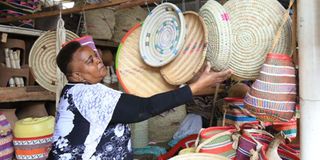Fund launches products to boost businesswomen

Ms Jane Kanyari, a businesswoman at Mudavadi Market in Nyeri County, in November, 2020. Women Enterprise Fund now urges small businesswomen to take advantage of their new products.
What you need to know:
- The Women Enterprise Fund has unveiled two new products that will boost women’s participation in business.
- WEF has also enhanced financing to women groups of from Sh750,000 to Sh1 million.
- Gender Cabinet Secretary Prof Margaret Kobia says government is committed in uplifting the lives of women in the country.
The Women Enterprise Fund (WEF) has unveiled two new products that will boost women’s participation in business.
While launching the products in Meru on Friday last week, Public Service and Gender Cabinet Secretary Prof Margaret Kobia encouraged women to take advantage of affordable soft loans offered by WEF.
“No woman belonging to a group should lack funds to start or run a business in this country,” said Prof Kobia as she disbursed Sh39 million to various women’s groups.
One of the products is a flexible lending model that gives women autonomy to borrow money for individual projects under the umbrella of their groups.
WEF has also enhanced financing to women groups of from Sh750,000 to Sh1 million.
Start-up capital
While speaking in Nairobi on Wednesday last week during the launch of Climate Smart Agriculture (CSA) Prof Kobia added the government is committed in uplifting the lives of women in the country. CSA will benefit 2,400 women.
The CS noted that other resources like the National Government Affirmative Action Fund (NGAAF) are testament of the government’s commitment to empower women.
WEF is now urging women to take advantage of the two products to empower themselves.
A study by the International Centre for Research on Women and Kenya Association of Manufacturers released in September last year, found that raising start-up capital is among the biggest challenges women entrepreneurs in Kenya’s manufacturing sector face.
The study noted that banks required collateral, which most women do not have, making it difficult for them to venture into the manufacturing.
Self-help groups
“While government initiatives encourage enterprise development, most respondents reported difficulties in accessing those funds. Instances of sexual exploitation in exchange for credit facilities and compliance clearances were mentioned,” the report said.
WEF has been instrumental in facilitating and supporting small women-owned enterprises to develop linkages with established enterprises and institutions for business and mentorship.
Since inception, WEF has disbursed more than Sh10 billion to self-help groups benefitting 1.2 million individual women across the country.





